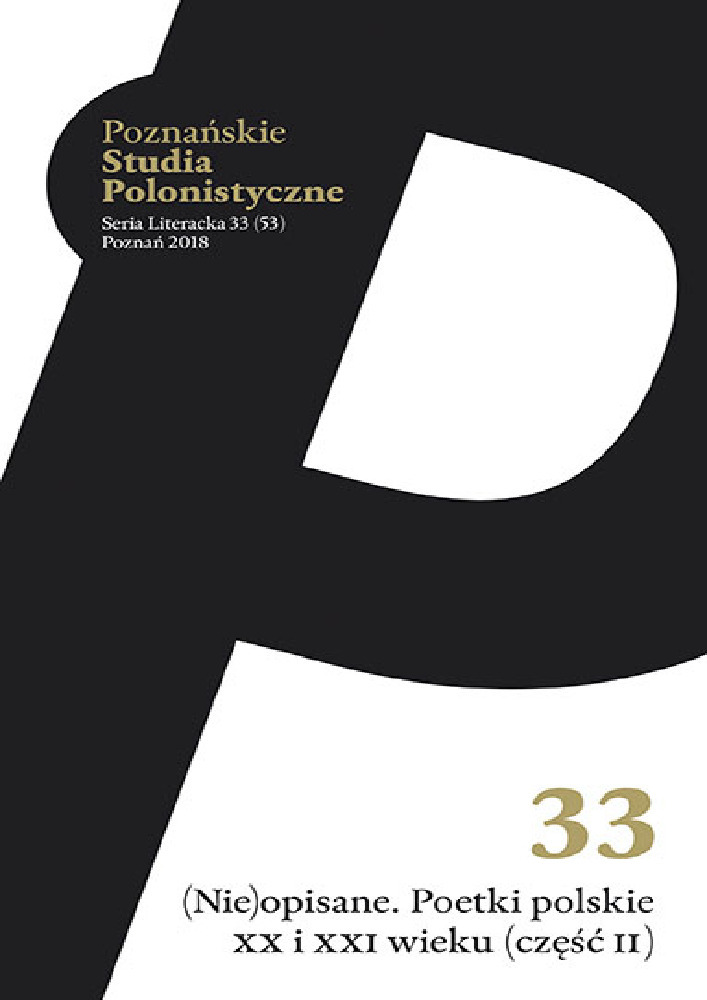Abstrakt
The bilingual poetry of Irena Klepfisz, a Polish-born Jewish-American poet, seems to constitute a unique case of Holocaust poetry. The poet, an intellectual and activist engaged in lesbian, queer, feminist and gender movements, advocates the reading of Holocaust poetry within the ramifications of gender oriented cultural theories. Her bilingual poetry undermines the hypothesis of the postvernacularity of contemporary Yiddish. The paper substantiates the thesis that the choice of the target language in the translaton of bilingual Holocaust poetry has clear axiological underpinnings.
Bibliografia
Boase-Beier Jean (2015), Translating the Poetry of the Holocaust. Translation, Style and the Reader, Bloomsbury Academic, London [ebook].
Gershon Karen (1994), A Lesser Child. An Autobiography, Peter Owen, London.
Gershon Karen, red. (1966), We came as children. A collective autobiography, Victor Gollancz ltd, London.
Greville Anthony (2012), Lotte Kramer’s collection, „AJR Journal”, t. 12, nr 5, http://www.ajr.org.uk/journalpdf/2012_May.pdf [dostęp: 12 lutego 2017].
Gross Natan, red. (1993), Poeci i Szoa. Obraz Zagłady Żydów w poezji polskiej, Offmax, Sosnowiec.
Horowitz Sara R., Holocaust Literature, w: Jewish Women’s Archive, https://jwa.org/encyclopedia/article/holocaust-literature [dostęp: 5 lutego 2017].
Horowitz Sara R. (1998), Women in Holocaust literature: engendering trauma memory, w: Women in the Holocaust, red. Dalia Ofer, Lenore J. Weitzman, Yale University Press, New Haven–Connecticut, s. 364-377.
Keff Bożena, red. (2012), Tango łez śpiewajcie muzy. Poetyckie dokumenty Holokaustu, ŻIH, Warszawa.
Klepfisz Irena (1990a), A Few Words in the Mother Tongue. Poems Selected and New (1971-1990), The Eight Mountain Press, Portland, Oregon.
Klepfisz Irena (1990b), Dreams of an Insomniac. Jewish Femnist Essays, Speeche san Diatribes, The Eight Mountain Press, Portland, Oregon.
Klepfisz Irena (2016), Yiddish: It’s Complicated, w: Languages of Modern Jewish Cultures. Comparative perspectives, red. Joshua Miller, Anita Norich, University of Michigan Press, Ann Arbor, Michigan, s. 394-406.
Kramer Lotte (1999), Heimweh. Homesick, red., przeł. Beate Hőrr, Brandes & Appsel, Hamburg.
Kubińska Olga (2016), Od „ni takiego, ni owakiego” do postawy „stereoskopowej i stereofonicznej”: pisarze wobec bilingwizmu, „Tekstualia”, nr 3 (46), s. 5-16.
Lawson Peter (2008), Three „Kindertransport” Poets, „Critical Survey”, t. 20, nr 2, Holocaust Poetry, s. 88-102.
Markiewicz Henryk, red. (1997), Żydzi w Polsce. Antologia literacka, Universitas, Kraków.
Markowski Michał (2006), O reprezentacji, w: Kulturowa teoria literatury. Główne pojęcia i problemy, red. Michał Paweł Markowski, Ryszard Nycz, Universitas, Kraków, s. 288-296.
Niger Samuel (1941, 1990), Bilingualism in the history of Jewish Literature, Louis la Med Foundation, Detroit–Michigan.
Ofer Dalia, Weitzman Lenore J., red. (1998), Women in the Holocaust, Yale University Press, New Haven–Connecticut.
Paterson Nancy J., red. (2001), Against Amnesia. Contemporary Women Writers and the Crises of Historical Memory, University of Pennsylvania Press, Philadephia–Pennsylvania.
Pavlenko Aneta (1998), Second Language Learning by Adults: Testimonies of Bilingual Writers, „Applied Linguistics”, t. 9, nr 1, s. 3-20.
Rosenfeld Alvin Hirsch (1980), A Double Dying: Reflections on Holocaust Literature, Indiana University Press, Bloomington-Indiana.
Roth Laurence (1999), Pedagogy and the Mother Tongue: Irena Klepfisz’s „Di rayze aheym/ The journey home”, „Symposium”, t. 52, nr 4, s. 269-278.
Rowland Antony (2005), Holocaust Poetry: Awkward Poetics in the work of Sylvia Plath, Geoffrey Hill, Tony Harrison and Ted Hughes, Edinburgh University Press, Edinburgh.
Schiff Hilda, red. (1995), Holocaust Poetry, Saint Martin’s Press, New York.
Schmid Monika S. (2002), First Language Attrition, Use and Maintenance. The case of German Jews in anglophone countries (Studies in Bilingualism), John Benjamins Company, Amsterdam.
Schreiber Maeera Y. (2007), Singing in a strange land. A Jewish American poetics, Stanford University Press, Stanford–California.
Shandler Jeffrey (2006), Adventures in Yiddishland. Postvernacular in Language and Culture, University of California Press, Berkeley [ebook].
Sherry Simon (2008), Yiddish in America, or styles of self translation, w: Beyong Descriptive Translation Studies: Investigations in Homage to Gideon Toury, red. Anthony Pym, Miriam Schlesinger, Daniel Simeoni, John Benjamins Publishing Company, Amsterdam–Philadelphia, s. 67-78.
Szirtes George (2014), What being bilingual means for my writing and identity, „The Guardian”, 3 maja, https://www.theguardian.com/education/2014/may/03/george-szirtes-bilingual-poetry-translation [dostęp: 8 maja 2018].
Szwarcman-Czarnota Bella (2006), Mocą przepasały swe biodra. Portrety kobiet żydowskich, Fundacja im. Profesora Mojżesza Schorra, Warszawa.
Szwarcman-Czarnota Bella (2010), Dylematy świeckiej tożsamości żydowskiej w dwujęzycznej poezji Ireny Klepfisz, w: Nieme dusze? Kobiety w kulturze jidysz, red. Joanna Lisek, Wydawnictwo Uniwersytetu Wrocławskiego, Wrocław, s. 242-256.
Weiman-Kelman Zohar (2010), Onrirn di cajt – dotykając czasu. O erotyzmie jidysz, przeł. Anna Ostrowska, „Cwiszn”, nr 3, s. 18-23, http://www.cwiszn.pl/files/files/zohar_18-23.pdf [dostęp: 1 lutego 2017].
Weyland Marcel, red. (2007), Echoes. Poems of the Holocaust, przeł. Marcel Weyland, Verand Press, Blackheath.
Żółkiewska Agnieszka, red. (2012), Słowa pośród nocy. Poetyckie dokumenty Holokaustu, przeł. Marek Tuszewicki, Agnieszka Żółkiewska, Michał Koktysz, ŻIH, Warszawa.
Licencja
Autorzy
Autorzy tekstów przyjętych do publikacji w czasopiśmie „Poznańskie Studia Polonistyczne. Seria Literacka” są zobowiązani do wypełnienia, podpisania i odesłania na adres redakcji umowy o udzielenie nieodpłatnej licencji do utworów, z zobowiązaniem do udzielania sublicencji CC.
Zgodnie z umową, autorzy tekstów opublikowanych w czasopiśmie „Poznańskie Studia Polonistyczne. Seria Literacka” udzielają Uniwersytetowi im. Adama Mickiewicza w Poznaniu niewyłącznej i nieodpłatnej licencji oraz zezwalają na użycie sublicencji Creative Commons Attribution-NoDerivatives 4.0 International (CC BY-ND 4.0).
Autorzy zachowują prawa do dalszego, swobodnego rozporządzania utworem.
Użytkownicy
Zainteresowani użytkownicy internetu uprawnieni są do korzystania z utworów opublikowanych od 2016 roku w „Poznańskich Studiach Polonistycznych. Serii Literackiej” pod następującymi warunkami:
- uznanie autorstwa – obowiązek podania wraz z rozpowszechnionym utworem, informacji, o autorstwie, tytule, źródle (odnośniki do oryginalnego utworu, DOI) oraz samej licencji;
- bez tworzenia utworów zależnych – utwór musi być zachowany w oryginalnej postaci, nie można bez zgody twórcy rozpowszechniać np. tłumaczeń, opracowań.
Do wszystkich tekstów opublikowanych przed 2016 r. prawa autorskie są zastrzeżone.
Inne
Uniwersytet im. Adama Mickiewicza w Poznaniu zachowuje prawo do czasopisma jako całości (układ, forma graficzna, tytuł, projekt okładki, logo itp.).
